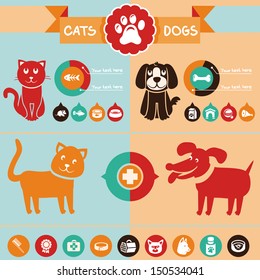Pets in day care receive great deals of exercise, socialization with other pets and special experiences. This can be especially useful for puppies and pets with behavior issues.
There are a number of lawful factors to consider you need to consider when starting a dog childcare organization. These consist of the structure of your company and compliance with federal government guidelines.
1. Dog Distemper
Canine distemper is spread out via straight contact with the physical liquids and waste of a contaminated dog, but it can also be transmitted via shared water and food bowls or through airborne droplets. This highly infectious disease is most harmful for young puppies, however it can affect pet dogs of any kind of age and is deadly for the majority of if left untreated.
Initial symptoms of canine distemper typically imitate a cold, consisting of drippy eyes and nose with watery or pus-like discharge. As the illness advances, a canine will establish fever, coughing, decreased appetite, vomiting and diarrhea. The virus can also attack the nervous system, resulting in seizures, twitching and partial or complete paralysis.
Reliable daycares reduce exposure to infection by requiring inoculations, regular health examinations and adhere to rigorous health procedures. If your pup seems overly weary or hopping, a day off might assist him recuperate, but you should avoid taking him back to childcare till these signs clean up.
2. Kennel Cough
Kennel coughing, additionally referred to as contagious canine tracheobronchitis or Bordetella, is a highly transmittable viral or microbial illness that impacts the respiratory tract. It's generally moved with the exchange of saliva or air droplets that a sick pet breathes out. Social pet dogs are at greater danger for infection because of their frequent interaction with each other, such as when they play, share food or water, sniff one another or merely satisfy in a crowded environment like a pet park or day care.
The most common signs and symptom of kennel coughing is a consistent and powerful cough that seems like something embeded the throat or retching. Typically, canines will divulge foamy white phlegm. If left untreated, a dog can create pneumonia and be at significant danger for life.
A reliable daycare center ought to have strict cleansing and cleanliness protocols, disinfect all playthings, food and water bowls frequently, and be open about their inoculation plans. Keeping your pet as much as date on their inoculations, especially for bordetella and canine flu, will greatly reduce their possibilities of getting the disease.
3. Parvovirus
Canine parvovirus, or parvo, is a board and train dog near me very infectious viral illness that can be harmful for young puppies and young adult pets with bad immune systems. It's most generally spread by straight contact with polluted dog feces-- which can take place when dogs smell, lick, or taste contaminated feces-- and indirectly from polluted individuals, items, or settings (like kennels, brushing areas and yards). Pups and pet dogs without full inoculation histories are particularly susceptible to parvo.
The infection is extremely durable, surviving in the setting for as much as nine years, and can quickly be transferred in between dogs by call through feces or on footwear, clothing, and bed linens contaminated with parvovirus. Otherwise treated promptly with IV fluids, electrolyte equilibrium, vomiting control medicines and anti-biotics to avoid second bacterial infections, a pet will quickly dry out and develop serious diarrhea, which causes shock and blood poisoning. Parvo is challenging to heal once a pet dog has actually ended up being ill, yet with suitable vet treatment, numerous pups do survive this health problem.
4. Canine Flu
Pooch influenza infection is very contagious and spreads with direct get in touch with, sharing food and water bowls, licking or nuzzling various other dogs, with air-borne droplets, and with infected surfaces. Inoculation works in reducing the danger of infection and episodes.
Many impacted dogs establish a light respiratory infection with a coughing that lasts 1-3 weeks. They might likewise have nasal and eye discharge, sneezing, and lethargy. A few of one of the most serious situations lead to pneumonia and a high fever.
If your dog displays any one of these signs and symptoms, do not bring them back to daycare up until they are healthy and balanced. If your canine is revealing indicators of extreme tiredness or hopping, talk to your vet as soon as possible and make sure they are on healthiness supplements to help develop their resistance. A vet will assess your canine for signs of the influenza by taking a sample from the nose or throat, and blood tests can be done to verify.
